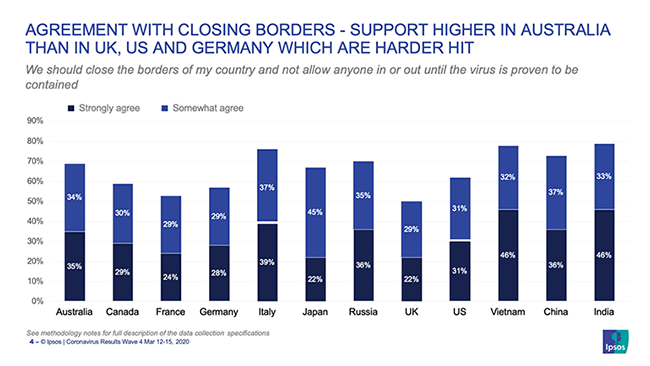Majority of people want borders closed as fear about COVID-19 escalates
The key findings for Australia from this latest Ipsos study show that:
- we are among the most likely to agree with closing the borders, seven in ten (69%) agreeing with this measure;
- we are also among the most likely to think someone close to us will get the coronavirus (51%, which is up 29 points from the previous poll on February 28-29);
- our concern regarding our job being under threat remains relatively low (35%) although it is on the rise. In the February 14-15 poll it was at 17% then rose to 25% in the February 28-29 poll;
- and our perceptions about the threat to our country are also relatively low, with 46% viewing it as very high or high, as many other countries are in the 60 to 70% range.
Download the full topline report
The Ipsos survey also found that the majority of people across 12 nations think the borders of their country should be closed until the coronavirus outbreak is contained.
In a survey of 12,000 people across 12 major countries from March 12 to 15, countries in the Asia- Pacific region are most supportive of border closures – led by India (79%) and Vietnam (78%) - which is not surprising, given where the disease was first encountered.
More than three in four people in the world’s other hot spot, Italy (76%), are also in agreement of this drastic measure followed by those in China (73%), Russia (70%) and Australia (69%).

A significant driver in the growth for concern about COVID-19 is that more of us now believe someone close to us will be infected by the virus. The majority of people in Vietnam (67%), the United Kingdom (57%), India, Australia and Japan (51%) think someone close to them will get the coronavirus.
Meanwhile, the countries that saw the biggest jump in this measure from a previous poll conducted on February 28-29 are all developed markets – the U.K. (+31 points), Australia (+29), and Canada (+28).

In addition to this, there’s been an increase of people who think their job is under threat as the pandemic spreads. There’s been a significant rise on this measure from previous polling done in Italy (63%, up 36 points) ̶ considering closures in its economy, followed by France (44%, up 14 points) and the U.K. (33%, up 13 points).

Overall, the perception of the threat the pandemic poses to a country has increased with a majority of people citing it as least as a high threat in all countries, except for in Canada (32%), Russia (37%), the U.K. (45%) and Australia (46%).
Ipsos Australia Director, David Elliott, said: “One of the hardest things about these surveys is that things are changing so quickly. It doesn’t surprise me that last weekend we were less concerned than most in regard to the likely impact on our jobs and country. Clearly the Government’s messaging around ‘business as usual’ but taking precautions and using common sense has been having an impact. However, with the quick change in messaging and measures such as shutting down major sporting events, Anzac day events, and in fact all external events of more than 500 people and internal gatherings of more than 100 people; and the continued discussion around whether to close schools or not, it is likely that we see these measures move drastically when we interview again this weekend.”

